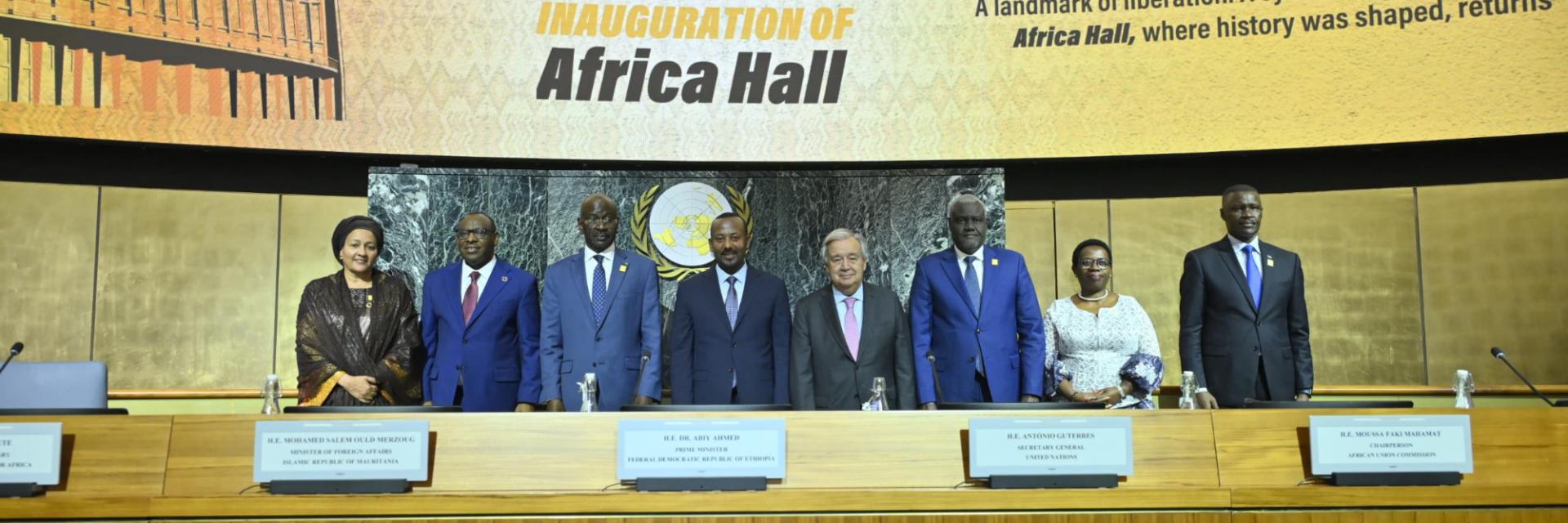Addis Ababa, Ethiopia, 21 October 2024 (ECA) - The iconic Africa Hall was officially inaugurated after years of renovations, with a resounding call to commit to Africa’s sustainable future – one that allows culture and heritage to thrive as important resources that can benefit communities.
Following extensive works, Africa Hall stands as a modernized yet historically preserved site, reflecting its continued significance in pan-African and global diplomacy due to its place in history as the birthplace of the Organization of African Unity (OAU), whose charter was signed by African leaders in 1963. In 1999, the OAU decided to create a new continental organization - the African Union - to build on its work.
During the ceremony, Abiy Ahmed, Prime Minister of the Federal Democratic Republic of Ethiopia, said Africa Hall is a symbol of unity, hope and resilience where the seed of a continental vision was planted inspiring the continent’s ongoing quest for independence and self-reliance.
“The decisions made in this hall have echoed far beyond its walls, influencing African policies and position on the global stage,” said Prime Minister Abiy.
He reaffirmed Ethiopia’s continued support to the Africa Hall project as a hub for exploration, learning and revitalization as Africans have solutions for addressing their challenges for the continent’s well-being.
António Guterres, Secretary-General of the United Nations acknowledged the continent’s progress since 1961 when only 26 African Nations had gained independence.
“This Hall is a bridge between Africa’s past and future – honoring shared struggles and achievements while embracing common aspirations,” he said.
Emphasizing the need for cooperation and addressing challenges like climate change, conflict and poverty, Mr. Guterres called for reforms in global institutions particularly the Security Council and international financial systems to better serve Africa’s needs.
He highlighted the recent agreements such as the pact for the future, the global digital compact and the declaration on the future generations which aim to modernize governance.
Moussa Faki Mahamat, Chairperson of the African Union Commission, described the inauguration as a celebration of the past and recommitment to a collective future with a focus on transforming Africa into a political, monetary and financial power, driving administrations and people towards a common goal.
Mr. Faki stressed the need to give a concrete form to the vision of the founding fathers with a focus on creating the best incarnation of their efforts. To enhance cooperation for the betterment of Africa, he stressed the importance of partnerships, particularly between the AU and the UN.
For his part, Claver Gatete, Executive Secretary of the ECA expressed special gratitude to the Government of Ethiopia for the gift of Africa Hall in 1961, which became the starting point of an African renaissance; and to the member states and partners “for bringing this historic project to life.”
Africa Hall is a symbol of our shared history and aspirations. As we confront today’s challenges, this iconic space embodies the strength of our past and the promise of a future rooted in resilience, heritage and collaboration, he said, emphasizing the need for economic investment in sectors like tourism to harness Africa’s history, culture and heritage.
Mohamed Salem, Minister of Foreign Affairs, Mauritania, representing Mauritanian President and Chair of the African Union for 2024 expressed gratitude for the UN’s role in the renovation of Africa Hall and the AU’s mission to achieve unity, solidarity and development. He highlighted the importance of the AU in achieving goals set by the founding fathers including unity and solidarity among African countries.
Highlighting the role of the Africa Hall board in steering the project to a successful outcome, Rwandan Ambassador Charles Karamba, Chair of the Africa Hall Advisory Board commended the dedication of the Africa Hall project team and for completing the project on time and with a focus on risk management and heritage preservation.
“The renovated Africa Hall is presented as a monument to the African journey with the hope that it will inspire visitors to reflect on the past, assess the present and chart a better course for future generations,” he said.
The session moderator, actress and musician Ms. June Gachui challenged all leaders present to remember the women warriors, leaders, healers and architects who remain forgotten in the struggle for independence across Africa. In her spoken word performance, she said, “If there were founding fathers, there must have been founding mothers.” She called for commitments to supporting the creative sector, which fuels creative economies.
Also present were descendants of family members of the founders of the OAU: Representing Ethiopia’s Emperor Haile Selassie I were His Majesty’s grandsons, Prince Ermias Sahle Selassie and Prince Be'ede Mariam Mekonnen of Ethiopia. Ethiopian Prime Minister at the time, Mr. Tsehafi Tezaz Aklilou Habte-Wold was represented by his nephew, Mr. Amde Akalework.
Mr. François Tombalbaye was represented by his nephew, Mr. Beadrone Ngarbaye Tombalbaye. Kenya’s first Vice President Jaramogi Oginga-Odinga, who officially stood in for the African Liberation Movements in Non-Independent Territories at the signing of the OAU charter was represented by his children: Kenya’s Former Prime Minister, Raila Odinga, Dr. Oburu Odinga and Rosemary Adhiambo Odinga.
Issued by:
Communications Section
Economic Commission for Africa
PO Box 3001
Addis Ababa
Ethiopia
Tel: +251 11 551 5826
E-mail: eca-info@un.org
More information about Africa Hall: https://africahall.uneca.org
Historical images: https://africahall.uneca.org/node/7
Renovation: https://africahall.uneca.org/page/inauguration-renovated-africa-hall
Catch the video-on-demand on inauguration: https://webtv.un.org/en/asset/k11/k11zas88cf

